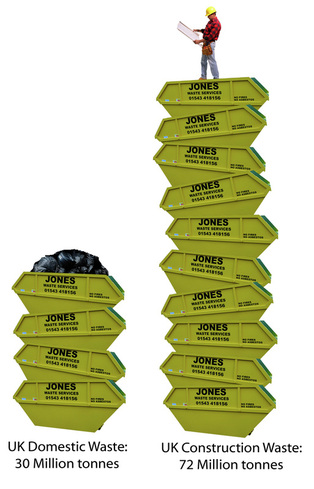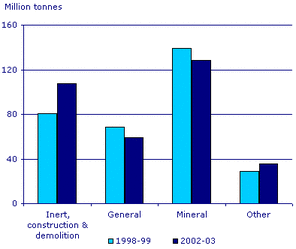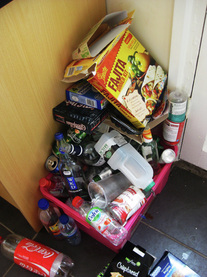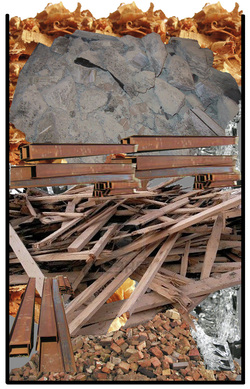- Home
- Project Waste
- Statistics
- What's Wasted
- Why is it Wasted
- Material Lifecycle
- Recycling
- Landfill
- Smart Manufacture
- Design for Disassembly
- Simple Construction
- Avoiding Wasteful Techniques
- Legislation & Policy
- Case Studies
Do we actually realise the extent to which we waste?
Overview
Humans tend to waste a lot of resources, materials and other elements that don't have a physical form (time, for example). In this page I'm going to look at exactly what sort of things we throw away narrowing my focus on the Construction Industry to see what Architects,Contractors and Designers in general, waste.
Water
- On average, each person in a household uses 140 litres of water per day
- The whole of the UK uses 345,798,000 kWH of electricity which is only 2% of the entire wolrds yearly comsumption
- However the UK’s population is only 0.9% of the world.
- An average amily with two children uses 5,480 kWh of electricity
- A typical 3 bedroom house uses 25,000 kWh of gas a year
With the garbage produced in America alone, you could form a line of filled-up garbage trucks and reach the moon
Waste in the Construction Industry

Construction waste consists of any unwanted material produced by the construction industry.
It can include:
It can include:
- Brick;
- Concrete;
- Wood (damaged or unused, in the form of offcuts);
- Rubble;
- Insulation;
- Nails;
- Electrical Wiring;
- Waste originating from the site;
- Asbestos;
- Hazardous Substances;
- The construction industry has a major impact on the environment, both in terms of the resources it consumes and the waste it produces. The waste produced varies at each stage of the construction process.
- Over 90% of non-energy resources in the UK are used by the Construction Industry

Research has shown that up to 15% of building materials that go into a construction site are wasted!
With estimates hinting that the UK's existing landfill sites could be full in as little as six years,the construction industry must accelerate progress in order to help reduce waste.There is the potential to recycle many elements of construction waste - Often roll-off containers are used to transport the waste. Rubble can be crushed and reused in construction projects. Waste wood can also be recovered and recycled
Domestic refuse accounts for only 10% of total waste in the UK, while the mountain of waste from construction remains a peripheral issue in comparison.
With estimates hinting that the UK's existing landfill sites could be full in as little as six years,the construction industry must accelerate progress in order to help reduce waste.There is the potential to recycle many elements of construction waste - Often roll-off containers are used to transport the waste. Rubble can be crushed and reused in construction projects. Waste wood can also be recovered and recycled
Domestic refuse accounts for only 10% of total waste in the UK, while the mountain of waste from construction remains a peripheral issue in comparison.
The Waste and Resources Action Programme (Wrap) estimates that this results in 13 million tonnes of fresh materials being thrown away every year. If we were more careful with what we waste on the construction site, millions of pounds could be saved, lowering the cost of building opening up so many more opportunities to develop.
By Matt McCreith






